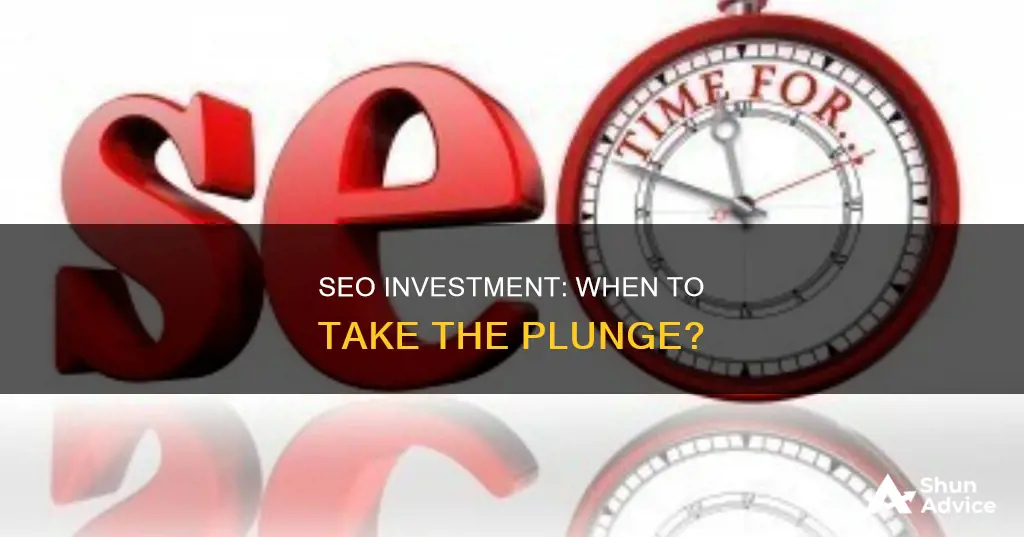
Investing in SEO is a critical step for any business with an online presence. In today's digital age, a website is essential, and Search Engine Optimization (SEO) is the key to ensuring your site is visible to potential customers. With the average person spending a whole day a week online, the internet has become the world's biggest and most competitive marketplace.
SEO is a long-term strategy that requires an ongoing investment of time and resources. It involves optimizing your website content so that it appears at the top of organic (unpaid) search results. This is not an immediate process, and it can take months or even years to see tangible results and a positive return on investment (ROI). However, the benefits of effective SEO are significant and include increased website traffic, better-quality leads, improved user experience, and enhanced brand awareness and authority.
There are several signs that indicate it's time to invest in SEO. For example, if your website is underperforming and generating few qualified leads, or if Google has stopped ranking your site due to questionable SEO tactics employed in the past. Additionally, if your Pay-Per-Click (PPC) advertising spending is spiralling out of control, or your site isn't ranking for your brand name, it's definitely time to consider investing in SEO.
By investing in SEO, you can connect with your target customers, drive exponential business growth, and establish yourself as an expert in your field. It's a collaborative and evolving process that requires a dedicated team with various skill sets, including technical SEO, keyword research, and content creation. While it may seem expensive and time-consuming, the potential rewards are well worth the effort, and there are cost-effective ways to get started, such as focusing on site architecture, content, and quality backlinks.
In conclusion, SEO is a powerful tool for any business looking to increase its online presence and reach its target audience. By investing time and resources into this long-term strategy, you can reap the benefits of increased visibility, improved user experience, and enhanced brand authority, ultimately driving business growth and outpacing your competitors.
What You'll Learn

When your website isn't performing well
There are several signs that your website is not performing as well as it could be, and that it's time to invest in SEO.
One of the most obvious signs is that your website is not ranking highly in search engine results pages (SERPs). This could be due to a number of factors, including poor website design, coding, or hosting, which can cause slow load times and turn visitors away.
Another sign is a high bounce rate. This means that people are landing on your page and leaving without taking any action. This could be because your website is not providing the information or value they are looking for, or it could be due to confusing navigation or poor mobile optimisation.
Low conversion rates are another indication that your website is not performing well. This means that people are not taking the desired action, such as making a purchase or signing up for your email list. This could be due to a variety of factors, including a confusing sales cycle, lack of trust, or poor website design.
If your website is not optimised for search engines, it is unlikely to rank highly in search results. This could be because your content is not fresh or relevant to your user's search queries, or because your SEO practices are outdated or questionable.
A lack of social sharing or social media presence can also impact your website's performance. Social sharing helps to build your reputation and increase traffic to your site, so it's important to provide shareable content and encourage discussion.
Finally, if your competitors are investing in SEO and you're not, you're likely to fall behind. SEO is a long-term strategy that requires time and expertise to be effective, so delaying investment will only make it harder to catch up.
Scams: Why People Fall for Investment Schemes
You may want to see also

When Google stops ranking you
Google is the biggest search engine, with over 90% of the search engine market share. If Google stops ranking your website, it is a serious issue that needs to be addressed. There are several reasons why this might happen, and several steps you can take to resolve the issue.
Firstly, it is important to check for viruses on your website. Visit your website and look out for any content that you did not put there, or any unexpected pop-ups or redirects. If you notice anything suspicious, contact your web developer to clean up your site. You can also use tools such as Sucuri Site Scan, or Google Chrome, which will alert you if your site has been hacked.
Secondly, check for any Google penalties. If your website has been flagged for any violations, you may be penalised and your ranking may drop. This can happen if your website has thin content, spammy content, or if you are keyword stuffing. Google also penalises sites that use link-building schemes, spammy keywords, scraped content, and hidden text. You can check for any penalties using Google Webmaster Tools, and resolve any issues that are reported.
Thirdly, your website may have disappeared from Google searches due to an algorithm update. Google makes thousands of algorithm updates per year, and your site may have been inadvertently affected. You can submit your site for crawling on webmaster tools, or request indexing through Google Search Console.
Finally, if your website is not mobile-friendly, it will be penalised by Google and will have trouble showing up in searches. Make sure your site has a mobile-friendly layout and functions well on phones and tablets.
It is important to remember that improving your SEO ranking takes time, and even with the best practices in place, it can take several months to see results.
Investments: Hold, Sell or Diversify?
You may want to see also

When your PPC spending is getting out of control
PPC, or pay-per-click, advertising can be an expensive endeavour, especially if you are utilising competitive keywords or generating an abundance of unqualified leads. If you are finding that your PPC spending is getting out of control, it may be time to invest in some quality SEO.
Firstly, it is important to understand the distinction between PPC and SEO. While PPC is like renting, allowing you to push straight to the front of the queue by paying to position your ad on the first page of search engine results, SEO is like buying, boosting your site's position in search engines organically.
If your PPC spending is becoming unsustainable, there are a few tactics you can employ to reduce costs:
- Pause keywords, ad groups, or campaigns: By pausing any campaigns, ad groups, or keywords that are performing poorly, you can bring down your overall spend.
- Drop bids: Dropping bids will either reduce your impression share or lower the position of your ads in comparison to other paid ads. While this will result in less traffic, each click will cost less, potentially improving your CPA or ROAS.
- Reduce spend on upper-funnel keywords: Upper-funnel keywords are those that users are likely to search for when they are early on in their conversion journey. While these can be beneficial for brand awareness, they are not as profitable as lower-funnel keywords. Reducing spend on upper-funnel keywords can help you maintain spend on your strongest-performing keywords.
- Bid to a lower CPA or ROAS target: By targeting a less aggressive CPA or ROAS, you can avoid dropping bids on keywords that are already bringing in conversions at a lower cost.
- Evaluate poor-performing dimensions: Look at whether a particular gender or age group is performing worse on your account and consider blocking out that dimension or applying a bid reduction.
- Limit location targeting: If you are targeting multiple locations, consider reducing spend on locations that are underperforming.
While these tactics can help reduce PPC spending, it is important to remember that SEO and PPC are meant to complement each other. Investing in SEO can help improve your website's organic search rankings, reducing reliance on PPC advertising. By optimising your website with relevant and effective keywords, you can attract more qualified leads and improve your overall marketing strategy.
GICs: Safe, Secure, and Simple
You may want to see also

When your site isn't ranking for your brand
If your website isn't ranking for its target keywords, or for any keywords at all, it could be due to a number of reasons.
Firstly, it's important to check your current search ranking. Tools like SERPs.com can help you understand your page's search ranking on Google, Yahoo!, and Bing, as well as your site's loading speed.
One of the most common reasons for low search rankings is that your website targets search keywords with a lot of competition. The more competitive your target keywords are, the more SEO work is required to rank on the first page. Analyzing your competitors using software like Moz, Majestic, or Ahrefs can help you understand the level of competition for your desired keywords.
Another reason could be poor on-page optimization. On-page optimization includes factors such as keyword-rich page titles, meta descriptions, XML sitemaps, and keyword density. Tools like Yoast SEO for WordPress and Moz On-Page Grader can help identify and fix on-page optimization issues.
Additionally, your website's content may be too "thin". Google's algorithm rewards the most relevant and helpful results, and data shows that top-ranked pages for competitive keywords usually have more than 2,000 words of unique content. Expanding the length, detail, and quality of your content can improve its rankings and search engine visibility.
Furthermore, your website may not have enough or the right types of links. Google's algorithm uses relevance and approval to determine if a page is the best result for a search keyword. Relevance is determined by the topic of the page and the anchor text of inbound links, while approval is based on the number and value of inbound links.
Finally, your website might be subject to a manual or algorithmic penalty due to bad link-building practices. Google takes action against black hat SEO practices like private blog networks, paid links, spam links, and hacked links. Manual actions and penalties can be viewed in the Google Search Console, and while they are difficult to reverse, you can attempt to fix them using the Disavow Tool or by manually removing bad links.
By addressing these potential issues, you can improve your website's search visibility and increase your chances of ranking well for your brand.
Starbucks Stock: Buy or Bye?
You may want to see also

When your competitors are investing in SEO
If your competitors are investing in SEO, it's a sign that you should be too. SEO is an essential tool for driving traffic to your website and improving your brand's visibility online. By optimising your website for search engines, you can increase your brand's authority and credibility, boost sales, and ultimately, achieve long-term success and growth.
Don't Get Left Behind
If your competitors are already utilising SEO strategies, they are likely to have a head start when it comes to search engine rankings. SEO is a long-term strategy, and it can take time to see results and make up ground. The sooner you invest in SEO, the sooner you can start reaping the benefits and staying competitive in your industry.
The Benefits of SEO
SEO is a powerful tool that can amplify your marketing efforts and help you reach a wider audience. It can improve the user experience on your website, making it easier for potential customers to find the information they are looking for and make a purchase. Additionally, SEO can help you build trust and credibility with your audience by creating valuable and informative content that answers their questions and provides solutions to their problems.
Stay Ahead of the Curve
By investing in SEO, you can ensure that your website remains visible and relevant in an ever-changing digital landscape. Search engine algorithms are constantly evolving, and by staying on top of the latest SEO trends and techniques, you can adapt your website to meet new requirements and continue to drive traffic and improve your search engine rankings.
Final Thoughts
Pyramid Schemes: Why the Appeal?
You may want to see also
Frequently asked questions
If your website isn't performing well in search engine results, it's time to invest in SEO. SEO is a long-term strategy that requires continuous investment and improvement.
SEO is a cost-effective marketing tool that can help your business in the following ways:
- Increase website traffic
- Improve user experience
- Increase brand awareness and authority
- Generate healthy returns on investment
- Maintain a competitive edge
- Drive exponential growth
Here are some signs that indicate it's time to start investing in SEO:
- Your qualified leads are close to zero.
- Google has stopped ranking your website.
- Your PPC spending is becoming harder to control.
- Your website isn't ranking for your brand name.
- Your competitors are investing in SEO.
- Your business isn't appearing on Google Maps.







